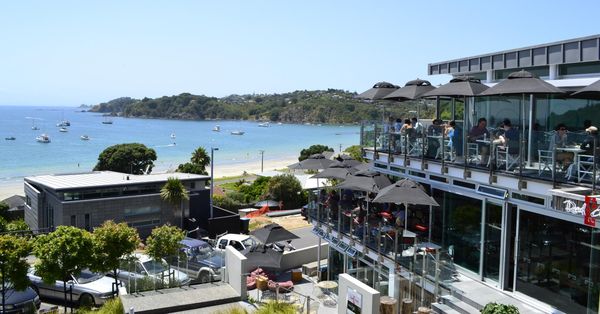
Kathryn Ryan: Bill McKay, who is a Senior Lecturer in the School of Architecture and Planning at the University of Auckland,
is here right now, and he has been looking into some of the housing policies that the parties are looking at for the election. Bill, thank you and welcome.
Full Audio Interview (transcription below):
Bill McKay: Kia ora, Kathryn. So you can tell that it’s the election year, can’t you? We’re seeing some very big numbers being chucked around about new houses to be built.
Kathryn Ryan: Yes. You’ve delved into it a little bit more deeply?
Bill McKay: Yeah, so Labour is promising to get to the bottom line, Labour is promising 100,000 new houses in 10 years, but Bill English recently mentioned that we’re going to see a housing boom over the next 6 years in which 200,000 houses will be built.
My question here is, for both of them is, is who’s building them, and how do we manage that? Where are they? And will they be affordable?
Kathryn Ryan: Which have been the same questions for about the last few years, indeed.
Bill McKay: Yeah. It’s been quite a few years now. And with those numbers as well, I don’t know who’s going to build them because we’ve got a real capacity. I mean, we all know how difficult it is to get a builder in New Zealand.
Kathryn Ryan: And allied trades.
Bill McKay: Yes. So we might be reliant on school kids with cardboard and plastic bags, I think. So, anyway, let’s run through what National, the current government, are promising, first. And by the way, it’s not a housing crisis; it’s a challenge, for them. So their big policy was special housing areas.
And with those, there are over about 200 of them throughout the country. So, you can put your hand up and say, “I own this few thousand square metres of land, here. I promise to build some dwellings on it.” And in return, you would get a fast-track consent through the council, resource consent, building consent.
But that hasn’t delivered. And in July, it was just announced that 86 out of 154, in Auckland, that’s over half of them, have been scrapped because what people were doing there is they were just land-banking.
Let’s talk about up-zoning, if you’ve got a chunk of land and the zone changes upwards and you can build more houses on it, or you get a freebie fast track through the council or something like that, that makes your land more valuable.
So lots of people were applying for that SHA, Special Housing Area rating, and then just sitting on it. So that’s been a failure, I’m afraid. The next thing that National have been promising is the $1 billion infrastructure fund to help develop suburbs and get the storm water and the roads and all of that going.
The problem with that is that it’s a loan, so indebted councils can’t take that on. So what’s happened there, just very recently, is it’s morphed into a separate Crown agency that’s going to do the work. I’m worried about, kind of, the duplication of effort here. This is taxpayers’ money.
I would just give it to the local authorities and allow them to get onto it, rather than having both the local authority and a separate Crown agency involved in that.
Kathryn Ryan: Okay. And next?
Bill McKay: Yeah, so the one very positive idea that’s come out of National recently is the Urban Development Authority, and these work well overseas.
The idea is there that you acquire, in the same way that you can use the Public Works Act to acquire land for roading or motorways or something, you acquire land, maybe an old racecourse that no one’s really using anymore, it could be a big run-down area of housing, or a bit of light industry, or something like that.

You acquire that, you master plan it, and you get the consents for it. But overseas, these Urban Design Authorities are funded to get it built. And that’s the problem here. There’s no funding to build them.
And my worry there is that, at the moment, once you acquire the land and you can master plan it and consent it, then you get on to Fletchers or Hawkins or one of the big developers to do it. And my concern there is you’re acquiring land under the Public Works Act, and then, effectively, handing it over to a private developer.
I’ve got real ethical worries about that. Of course, RMA reform, reducing red tape, etc., etc., that’s something all the parties bang on about. But the other one that I’m concerned about is, and this is what Labour is proposing to do as well, is get councils to loosen land supply. And I will come back to that shortly.
So just moving on to Labour. So they’re going somewhere where the national government is not. Labour is saying that they will stop speculation. So one thing they will do is take that two-year bright-line test and push that out to five years to stop speculation.
And they’re also talking about no foreign land ownership in the country at the moment. And those are two areas where National is hesitant to go at the moment. Personally, I’m a little bit worried about banging on, punishing immigrants because we understand throughout the world that immigration is neutral.
It’s not a negative, or particularly a positive, in relation to a country. But stopping our cities becoming monopoly boards is certainly a good idea. Homes are for housing, primarily, not for speculators. So Labour’s big idea is KiwiBuild, and what they’ll do there is build 100,000 dwellings over 10 years.
And we do have some very useful detail on this. So 50% of it will be in Auckland and aimed at first home buyers. But you’ve got to hang onto that for that for five years. That’s fair enough. You can’t just flog it off after a couple of years.
And they’re talking about including apartments and townhouses in that as well, which I think is a very good idea. Auckland needs to get denser, and with that density, we get more diversity of housing as well. We’ve also told by Labour that there’ll be $2 billion worth of capital involved in that.
So that’s a nice chunky number, and we should be able to see something happen with that. That won’t build all the houses. Once the first tranche has been sold, they’ll recycle the money and carry on with that.
And something very similar to National’s Urban Development Authority is as an Affordable Housing Authority, and that’ll partner with developers, councils, and will also hold any surplus Crown land.
And they’re talking about green field development there, which is paddocks on the outskirts of towns and cities, but also brown fields as well, which is light industrial areas.
And welcome news to the rest of New Zealand, they’re not just talking about the outskirts of Auckland, but the Hutt Valley, Dunedin South, and Christchurch as well. So that’s what the big parties are promising at the moment.
Kathryn Ryan: Have you got a New Zealand First policy there? Have you seen an explicit New Zealand First policy on housing?
Bill McKay: Yes, there is one. They’re talking about basically grabbing that SHA land and acquiring that, and setting up an agency as well. So looking at the polling at the moment, I’m sure that we’ll see New Zealand First siding with either Labour or National, but they’re both on the same page there.
Kathryn Ryan: Well, the other thing is that land bank and it’s been an issue for the special housing areas, isn’t it?
Many of those special housing areas haven’t progressed because the problem is there is still the incentive to land bank while values rise. And so is what they’re eluding to now is, use it or lose it.
Bill McKay: Yeah, yeah. So, in the same way, an Urban Development Authority, National, or an Affordable Housing Authority, Labour, can acquire land through the Public Works Act, New Zealand First is saying they’ll acquire that land that’s currently there for special housing and do something with it.

Kathryn Ryan: At a fair value? Yeah.
Bill McKay: That’s the theory, yes.
Kathryn Ryan: What we’re seeing, then, are some reasonably common things. For a start, the government is going to have to intervene in this market.
Bill McKay: Yeah. So National has had nine years, and I haven’t seen much happening there. But the big themes is more central government action. And, certainly, since about mid-2016, National have been saying, “Yeah, the central government will govern, I suppose.”
And then the other common theme is creating these authorities, these agencies, reducing red tape. But the one that’s of real concern to me, and this is both Labour and National, is they want to release more rural land for development.
I think that’s a bad idea. I think we’re fixated on that kind of development because it’s the way we’ve always built.
Kathryn Ryan: Yeah, well, I mean it’s the “up versus out” debate. And to be fair to National, its argument was a market, to an extent, a market response, which is if the land is not being released for development, and it pointed a lot to how long it took the Auckland Council to get through that whole process of the regional plan and the unitary plan.
So it was, it would argue, hamstrung to a good degree in its solution by a bit. Are we still seeing that problem of release of land for development or permissions to go up more? And is that still a constraint?
Bill McKay: Certainly, not in Auckland in terms of going up because the unitary plan means Auckland will grow up.
Kathryn Ryan: It’s not just Auckland now, remember.
Bill McKay: No. But the problem with releasing more rural land everywhere and we’re talking about Queenstown, for instance, as well, further down the valley is you’re using up good arable land that could have vineyards on it or grow potatoes in Pukekohe, it’s unsustainable.
We spend much more money on infrastructure, such as roads, new sewage, new storm water, and that sort of thing, and we’re increasing traffic, so it’s just more of the same.
Kathryn Ryan: I know. But then you come back to the experience with the unitary plan, which was all those people who were already living in urban areas going, “No, we’re not going to have high-rises here,” so that challenge remains. Do you want to mention a new book out today?
Bill McKay: And also, coincidentally, the PSA has put out a new book, Progressive Thinking: 10 Perspectives on Housing, just being launched today. Disclaimer from me, I’m in that. But it will be in all good book shops everywhere, I’m sure.

Kathryn Ryan: Is it academics, is it architects, is it counsellors? Who’s in there alongside you?
Bill McKay: It’s a wide variety of people and very short pieces from everyone and in kind of the language that you can understand, not too many footnotes. But the big argument in there is a fundamental shift in thinking is needed, and I agree with that.
Kathryn Ryan: Thank you very much. That is appreciated as always. That is Bill McKay, who is Senior Lecturer in the School of Architecture and Planning at the University of Auckland.
Source: Radio New Zealand
P.S. Do you know of other people that will find this article useful? Please share it on social media. Thank you!